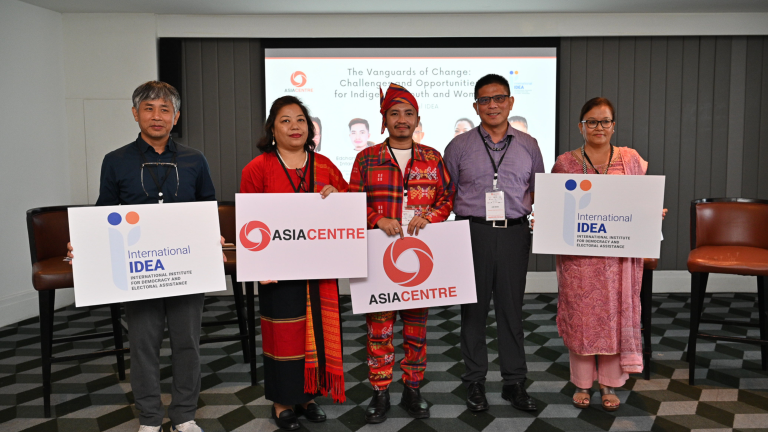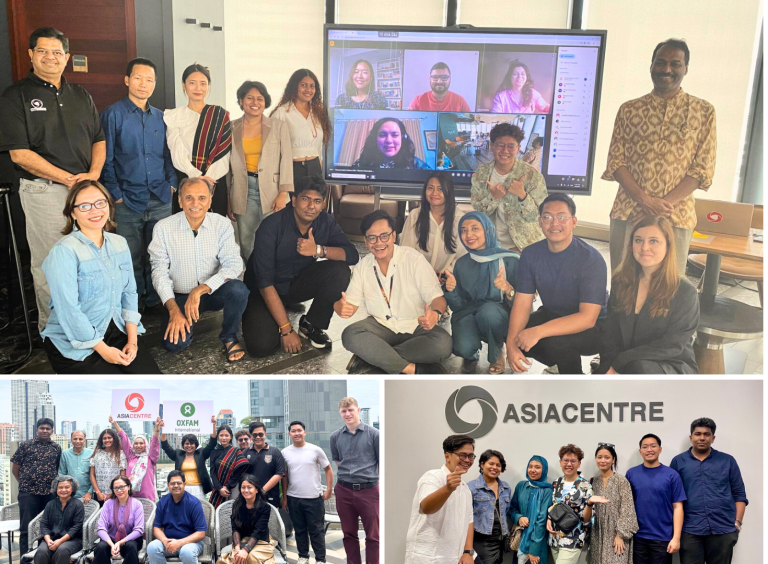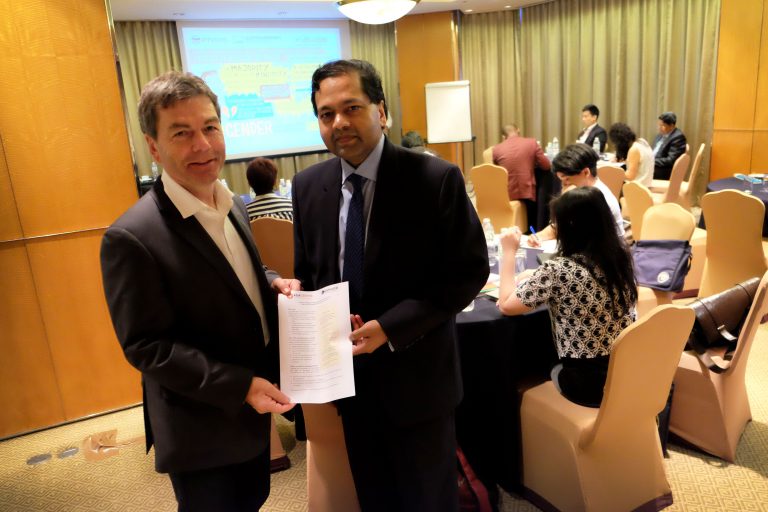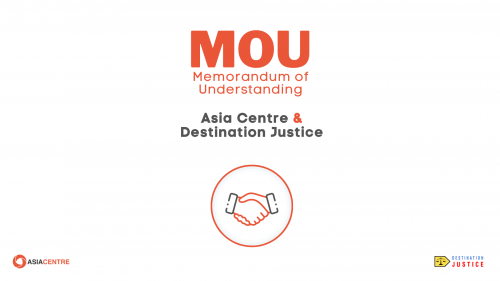
Indigenous communities across Asia are denied equal treatment and face significant challenges related to rights, representation and safety. Despite official legal recognition, these communities often feel powerless as the civic space to advocate for their rights and needs is diminishing.
This was the core message delivered via the panel titled “The Vanguards of Change and Opportunities for Indigenous Youth and Women” held by the International Institute for Democracy and Electoral Assistance (International IDEA) during Asia Centre’s 9th Conference “Shrinking Civic Space in Asia: Stories of Resistance and Pushback” in Bangkok from 21 to 23 August 2024. The panel served as a platform to amplify the voices of Indigenous peoples, providing them with a venue to share their messages and support their efforts to combat discrimination and advance the decolonisation of democracy.
The International IDEA hosted the panel featured four speakers: Renuka Gurung from International IDEA Nepal; Edchamcy “Edward” Abelardo from the Bangsamoro Autonomous Region in Muslim Mindanao (BARMM) & International IDEA IP Champions; Professor Awi Mona from Dong Hwa University; and Falguni “Flora” Tripura from the Bangladesh Indigenous Women’s Network (BIWN).

Charu Bikash Tripura, from the Asia Indigenous Peoples Pact (AIPP), moderated the panel and opened the discussion by emphasising that two-thirds of the world’s indigenous peoples reside in Asia. Despite the official recognition of Indigenous rights by the United Nations through the 2007 enactment of the United Nations Declaration on the Rights of Indigenous Peoples (UNDRIP), he noted that Indigenous communities across Asia continue to face significant challenges, including violence and discrimination. Tripura stressed the urgent need to enhance the rights, representation, and self-determination of indigenous communities across the region, highlighting the ongoing struggles these communities face in securing justice and equality.
Renuka Gurung from International IDEA Nepal highlighted that Indigenous communities in Nepal experience severe curtailments of their rights, including threats to their safety. She noted specific issues such as violence related to land grabbing, denial of fundamental rights like freedom of assembly, and instances of surveillance and harassment. These challenges reflect broader patterns of oppression faced by indigenous peoples in the region, underlining the need for increased protection and advocacy.
From his perspective, Edward Abelardo, highlighted the marginalisation and suppression of rights faced by indigenous peoples in the Philippines, pointing out their lack of political participation, denial of legal rights, and inadequate political representation. According to Abelardo, the COVID-19 pandemic exacerbated these challenges by causing widespread displacement and increasing hardships. He emphasised the urgent need for enhanced advocacy, public awareness, and protection for these communities, citing troubling reports of extrajudicial, state-sponsored killings of Indigenous representatives in the southern regions of the country.
The case of indigenous peoples in Taiwan was presented by Professor Awi Mona, National Dong Hwa University, highlighting the ongoing discrimination, hate speech, and legal obstacles faced by indigenous communities in Taiwan. He pointed out that these communities are denied full citizenship rights and that their advocates encounter racism and hostility. Despite Taiwan’s active civil society and movements like the Sunflower (2014) and Bluebird (2024) Movements pushing for constitutional reforms, indigenous peoples still face significant inequalities. Professor Mona criticised the limited and often superficial parliamentary representation of Indigenous peoples and emphasised the urgent need for improved protection and recognition of their rights.
Flora Tripura’s presentation focused on the challenges faced by indigenous communities in Bangladesh. She highlighted that, similar to the situation in the Philippines, indigenous peoples in Bangladesh struggle with a lack of recognition, public participation, and access to justice. Particularly concerning are the severe dangers faced by indigenous women in rural areas, including rape, human trafficking, and systemic discrimination. Flora pointed out that these women are often victims of gender-based violence exacerbated by land-grabbing issues. She noted that since 2007, over 700 Indigenous women have endured repression and violence related to land disputes, emphasising the critical need for funding to support advocacy efforts and safeguard the rights of Indigenous communities, as they are frequently denied access to government resources and financial support.
During the Q&A session, questions were raised related to the ratification of indigenous rights, risks of co-option and unrepresentative indigenous leaders in politics, the tensions between safeguarding indigenous self-governance and ensuring political participation as well as ways of how to support communities, network and social enterprise. In response to the questions, the panellists stressed the need to create systems that allow for democratic space for indigenous peoples within national frameworks, to ensure consultation and knowledge sharing and urging governments to be accountable for making indigenous voices heard and bringing various stakeholders together to safeguard and enhance the rights and recognition of indigenous communities.

This message was also underscored during the welcome remarks of the conference where Leena Rikkilä Tamang, Director for Asia and the Pacific at International IDEA emphasised that the curtailment of civic space, particularly marked by the decline in fundamental rights such as freedom of expression and freedom of the press, is a pressing contemporary issue.

Asia Centre and International IDEA have nurtured strong informal and formal connections and continue to advance their long history of collaboration. During Asia Centre’s 9th Annual International Conference, held from 21 to 23 August 2024, the longstanding partnership between the two organisations was further strengthened. It continues a collaboration which follows from previous engagements, that saw International IDEA being a title partner for Asia Centre’s 8th International Conference on “Democracy and Elections in Asia” in August 2023.
Their formal partnership began with the signing of a Memorandum of Understanding (MOU) in 2022, marking a commitment to advancing democratic values and practices through joint initiatives. Thereafter, their collaborative efforts have included several significant initiatives. One key event was a closed consultation on “Digital Authoritarianism in Southeast Asia,” which took place in Bangkok, Thailand on 8 December 2022. This consultation brought together representatives from UN agencies, diplomatic missions, and civil society to address the impacts of digital authoritarianism in the region. Earlier, Dr James Gomez, Asia Centre’s Regional Director, presented on the effects of disinformation on media trust at International IDEA’s “Democracy in Asia and the Pacific 2023 Outlook Forum” held in Bali, Indonesia in December 2022.
The partnership continued with the second annual Democracy in Asia and the Pacific Outlook Forum, held in October 2023 in Bangkok. This forum gathered 23 experts and scholars who engaged in in-depth discussions about the democratic challenges and opportunities within the region.
Moving forward, Asia Centre’s collaboration with International IDEA persists through its involvement with the Global Democracy Coalition. This coalition, convened by International IDEA, includes over 100 organisations committed to strengthening and protecting democracy on a global scale. Asia Centre’s active participation in the coalition’s campaigns at the Asia-Pacific level underscores its ongoing commitment to advancing democratic governance and civic freedoms.
The International Conference is Asia Centre’s annual event where it brings together its partners to share the outcomes of their programmes and network for future collaborations. Over the years, the conference has become a platform for a range of actors to meet and discuss key democracy and human rights issues.
To view the main conference article, articles on individual title partners, as well as TikTok videos and a photo album, read the main conference piece here.
If you would like to become a Conference partner for Asia Centre’s 10th International Conference “AI and Governance in Asia” or explore other collaboration opportunities, email us at contact@asiacentre.org. For more information, click here.
Asia Centre is a civil society research institute in Special Consultative Status with the United Nations Economic and Social Council. It serves as a knowledge partner and undertakes evidence-based research as well as provides capacity-building training for end beneficiaries. If you would like to collaborate with the Centre, please send an expression of interest to contact@asiacentre.org.
Follow Asia Centre’s social media channels for more information.




